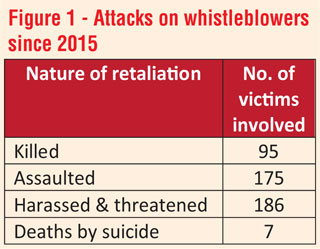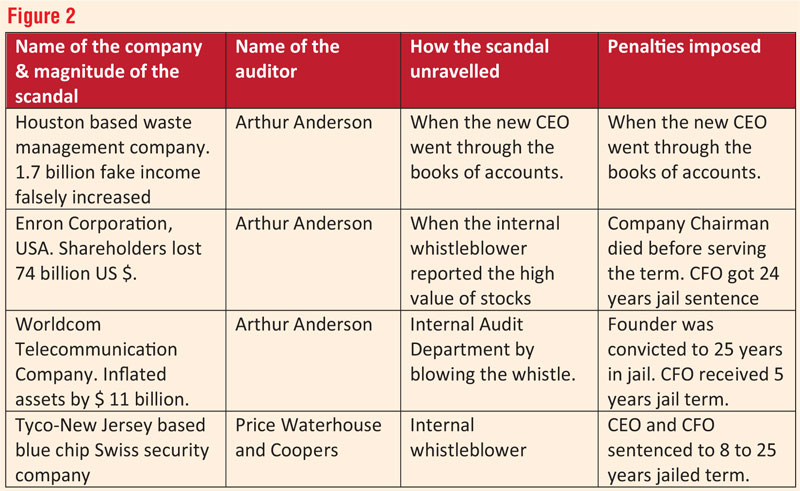Friday Feb 20, 2026
Friday Feb 20, 2026
Monday, 6 December 2021 00:01 - - {{hitsCtrl.values.hits}}
|
CAA former Executive Director Thushan Gunawardena
|
The word ‘whistleblowing’ has become a buzzword with the revelation of a major garlic scandal at Sathosa where the whistleblower, Thushan Gunawardena (TG), former Executive Director, of the Consumer Affairs Authority (CAA) exposed that a quantity of 56,000 kilos of garlic meant to be distributed to customers at the rate of Rs. 135 had been sold to a wholesale supplier.
It was alleged that the plan was to buy back the same consignment at Rs. 445 a kilo and make them available to the customers at Rs. 540 a kilo making a quick buck of Rs. 23 million by those who were involved in this mega corruption deal. However, the alleged plan went awry due to the intervention of the above whistleblower, blackening the image of the Government.
Domestic gas explosions
Whistleblower, TG came into the limelight again by exposing the arbitrary change of the composition of the propane and butane (70-30) that had practically existed in the domestic gas cylinders supplied by the supplier, Litro Gas Company, which enjoys a monopoly in the market and his intervention to the relevant authorities including the two ministers have not had any desirable impact from last April. Though the Litro Gas Company consistently maintained that the above composition had not undergone any changes, the trial tests carried out by the CAA under his supervision had proved that it has surreptitiously changed to 50-50, exposing the consumers to domestic explosions. On 30 November, a series of 15 explosions allegedly had taken place all over the country causing heavy damages to the houses and people.
It is not my intention to dwell with this racket as the corrupt deal is under investigation by the CID as a result of a complaint made by the Minister of Trade but to caution the whistleblower as well as the readers of any possible retaliations that could follow as a result of this whistleblowing. As a matter of fact, the whistleblower brazenly said at an interview over social media that a threat on his life is imminent and he had taken extra precautionary measures to protect his life as well as his family members.
 Whistleblowing protection to whistleblowers
Whistleblowing protection to whistleblowers
A whistleblower is a person who exposes information or activity that is deemed illegal, unethical, illicit, unsafe, fraud, corruption or abuse of funds to the higher authorities with the intention of arresting such unethical corrupt deals for the larger interest of the government and the people. With this view in mind all developed countries have promulgated legislative enactments protecting whistleblowers against retaliation.
In India, the Indian government had enacted ‘The Whistle-Blowers Protection Act 2014’ to provide framework to investigate alleged corruption and misuse of power by public servants and to protect persons who allege any wrongdoings. Despite the enactment of this Act, there has been an unprecedented increase in the corrupt deals in India and a rampant cry for strengthening various features of the Act for the last seven years to make it whistleblower-friendly and providing adequate protection.
USA is in the forefront as far as the protection of whistleblowers is concerned and special features are available to ensure that genuine whistleblowing complaints are received. It incentivises people to complain in case they observe any wrongdoings while at the same time penalises them, if their complaints are malicious. USA has also strong anti-retaliatory measures in place to protect the whistleblowing and at the other end of the spectrum also allows for anonymity of whistleblowing.
CIABOC and whistleblowing
What is truly shocking is that there is no statutory enactment for the protection of whistleblowers though the corruption has increased at an unprecedented scale under the successive governments. However, it is a matter for solace that the Commission to Investigate Allegations of Bribery and Corruption has submitted has compiled a well-studied document- Policy Suggestions for Proposed Legislative Amendments in 2019 (ISBN 978-624-5040-06-3) after making elaborate studies and consultative hearings of the various stakeholders after 27 years of existence in which COABOC has highlighted the necessity of bringing legislative enactments for the protection of the whistleblowers.
The CIABOC has accepted that the present legal framework pertaining to combating bribery and corruption has proven to be inadequate in that the absence of any reform for the last 25 years has rendered certain laws archaic. It has also said many policy interventions such as fiscal policies and administrative developments have necessitated revisiting the policy framework. It is heartening to note that the final chapter of the handbook contains a far-reaching recommendation on a potential policy for whistleblowing legislation. It is fervently hoped that the authorities would progressively act on the proposed legislative enactments without allowing gathering dust in their book shelves.
Retaliation to whistleblowers in India
Though our neighbouring India has made progressive enactments in the protection of whistleblowers, the attacks on whistleblowers in India has continued unabated as seen in Figure 1.
It is sad to note that much of these retaliations have been reported from Maharashtra, Karnataka, Delhi and Uttar Pradesh. Certainly, the number of incidents is under-reported as these cases stem from the news reports in the English media only. Unofficial estimates are pegged to be much higher.
Notable retaliation to whistleblower at Enron Corporation, USA
The Enron scandal was an accounting scandal of Enron Corporation, an American energy company based in Houston, Texas and it became a case study in corporate accounting chicanery in 2001. It was publicised in October 2001, and led to the bankruptcy of the company, and the de facto dissolution of Arthur Andersen, which was one of the five largest audit and accountancy partnerships in the world.
Enron Accountant Watkins had to resign after inaction by CEO Kenneth Lay as a consequence of exposure much bigger than the garlic scandal exposed by Thushan Gunawardena of the CAA, of large-scale accounting irregularities, and she was demoted 33 floors from her mahogany executive suite to a ‘shanky office’ with a rickety metal desk and a pile of make-work projects. Company Enron subsequently collapsed amid claims of regulatory indifference and complicity by auditors. Enron Founder Kenneth Lay died of a heart failure in the fourth month of its trial and its CEO Jeffrey Skilling was sentenced to 24 years in prison in one of the biggest corporate scandals in US history. The disgraced CEO forfeited 45 million worth of his assets including his house as a result of a mountain of shady deals.
Worst corporate accounting scandals
It is interesting to emphasise here that most notable accounting scandals running to billions of US dollars have taken place with the tacit connivance of the auditors. Ideally, we ought to have Auditors, Audit Committee Chairmen, COPE Committee members who are above suspicion like the proverbial Caesar’s wife. In the case of garlic scandal exposed by TG, the public are anxiously awaiting the findings of the Auditor General who have so far discharge his fiduciary duties exceptionally well.
As seen in Figure 2, you would see that in developed countries whistleblower’s blowing the whistle have brought the desired results unlike the developing countries like Sri Lanka. It is in this backdrop; the intervention of TG has to be viewed. When TG blew the whistle, he was reported to be the executive director of the CAA and his official status and capacity and the tone of the language would have certainly galvanised to authorities to swiftly move into action as far as the alleged garlic and the Litro gas scandals are concerned, which have undoubtedly put the Government in the position of a cat that defecated on a rock.
Revisit to the Fraud Survey 2011/12 by the KPMG Auditors
It would be a worthwhile exercise for the respective authorities to revisit the key findings of the fraud survey carried out by KPMG Auditors and satisfy themselves how far those recommendations have been put into practice during the last 10 years with a view to creating a corrupt-free corporate business environment in Sri Lanka by the public sector and the private sector.
The six initiatives suggested were (a) Strengthening employee and third party due diligence, (b) the implementation of a WB mechanism (both internal and external), (c) the establishment of a framework for monitoring the corporate ethics, (d) Fraud Awareness training, (e) Establishment of a dedicated and independent investigation unit lastly the introduction of a process specific fraud controls. The latest initiative that has come from the civil society is the naming and shaming of the fraudsters, including that of directors, auditors, accountants and errant regulators.
 Sri Lankan scenario
Sri Lankan scenario
The victims reported for blowing the whistle in Sri Lanka are mainly the journalists who have either been killed or assaulted. They include journalists Lasantha Wickrematunge, Prageeth Ekneligoda, Poddala Jayantha, Iqbal Athas et al. There have been hardly any victims from the corporate sector. Admittedly, there could be dismissals or forced resignations/resignations under frustration instigated by the employers similar to that of the resignation of TG who were unable to exert pressure and harassments at the hands of the employers.
Had the authorities heeded the whistleblowing of TG, the unfortunate deaths and the massive damages caused to the properties of the consumers could have been averted. The ‘do not care attitude’ and the sins of commissions and omissions adopted by the ministry in charge, Litro Gas Company, Sri Lanka Standards Institution, Government Analysts Department, Consumer Affairs Authority et al have collectively resulted in a criminal negligence at the cost of life, limbs and properties of the consumers. The carte blanche suspension of LPG supply for audit purposes would not be a firm solution to the issue in hand, unless the Litro Gas Company reverts to the former composition of the product mix.

(The writer is a Productivity Specialist and Management Consultant.)
(The content of this article is intended to provide a general guideline to the whistleblowers, readers as well as to the authorities regarding the protective measures to be taken to strengthen the whistleblowing mechanism in their respective domains. Professional advice may be sought on specific circumstances from the subject matter specialists.)